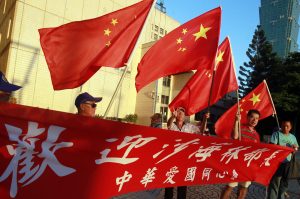Taiwanese national security officials want to criminalize the display of the five-star People’s Republic of China (PRC) flag on national security grounds, a move that would reignite a simmering domestic debate over protected speech.
Lawmakers are deliberating a bill proposed by Democratic Progressive Party (DPP) legislator Wang Ting-yu that would amend Taiwan’s National Security Act and criminalize certain actions deemed hostile to the nation.
The bill would ban “raising, lowering, hanging, displaying, holding or brandishing” a political or military flag of a hostile foreign power in public places. Those found guilty would be subject to fines of up to $1,782.
Wang proposed the amendment in October with support from 28 DPP lawmakers along with Chen Po-wei of the pro-independence Taiwan Statebuilding Party.
The Taipei Times reported on Tuesday national security officials had reviewed the proposal and recommended a minor punishment for displaying the flag on social order grounds, rather than amending the National Security Act.
Security officials raised concerns that levying punishments on national security grounds could lead law enforcement officials to be “criticized for running a police state,” according to the report. However, they also argued that ignoring the issue would “allow China to keep using the nation’s democratic principles for its own ‘united front’ work.”
Officials recommended amending Taiwan’s Social Order Maintenance Act, arguing that this would treat the issue as one of social order as displaying the flag could lead to public tension and conflict.
DPP officials have attempted in the past to amend or utilize the Social Order Maintenance Act to criminalize the spread of false information ostensibly serving the purposes of the Chinese government.
These attempts generally receive torrents of criticism from the opposition Kuomintang (KMT). International free speech advocates, along with organizations such as the Committee to Protect Journalists, have also condemned attempts to use the act to criminalize “fake news.”
Several KMT legislators are staunchly opposed to the efforts to criminalize the Chinese flag. In October, after Wang proposed the bill, KMT caucus secretary general Lin Yi-hua said it would be an “overreach of state power” to limit free speech, while caucus whip Lin Wei-chou said a draft act must define whether displaying the Chinese flag is considered subversion and is thus not protected speech.
Jang Chyi-lu, a legislator for the more moderate Taiwan People’s Party (TPP), argued that banning the flag would only be possible if a law is passed to define China as an enemy country. At the time, some KMT legislators also expressed support for such a law.
The Chinese flag is not commonly displayed in Taiwan, where a fractional minority of the population expressed support for unification. Among the general public, pro-unification protesters and activists are generally ignored or ridiculed.
The ruling DPP does tend to react swiftly when the display of Chinese symbols in Taiwan receives international attention. In 2018, authorities destroyed a temple that had been converted into a shrine for Chinese communism days after The New York Times reported on its existence.

































